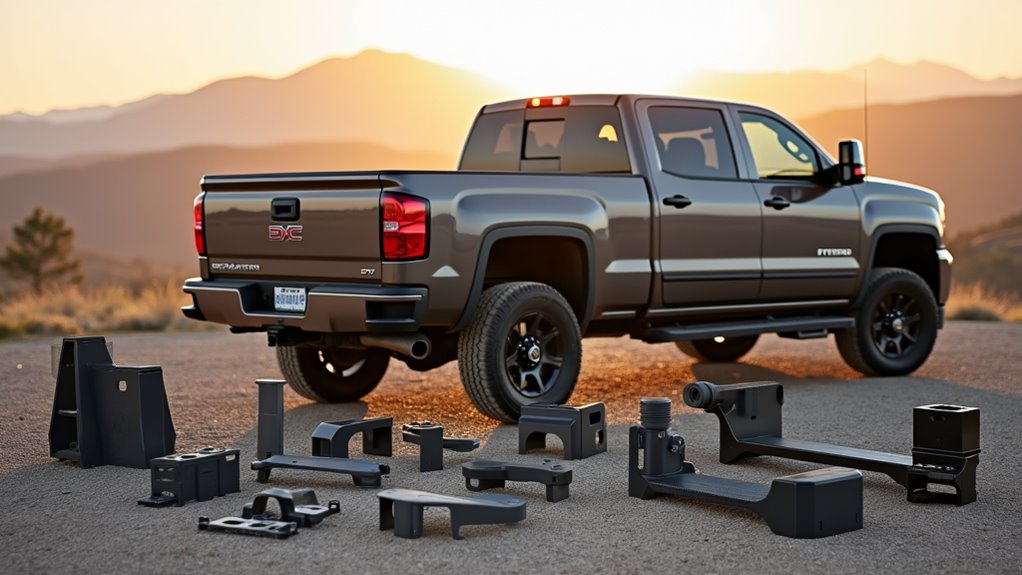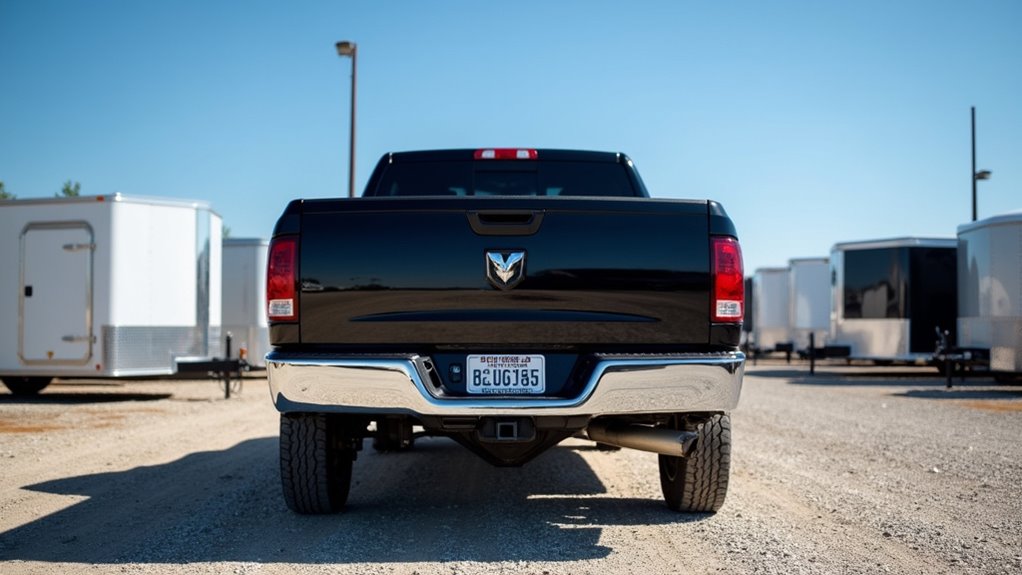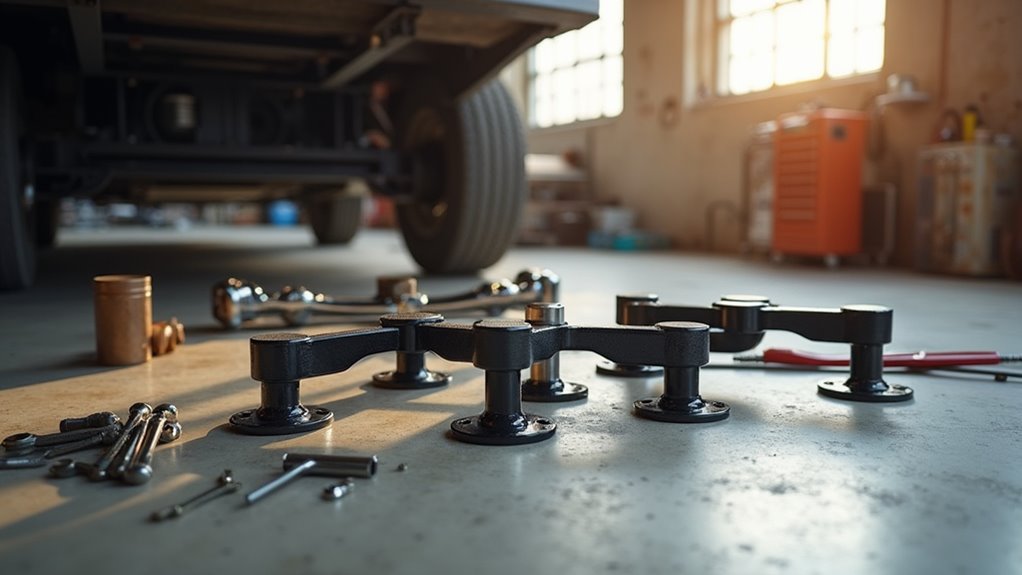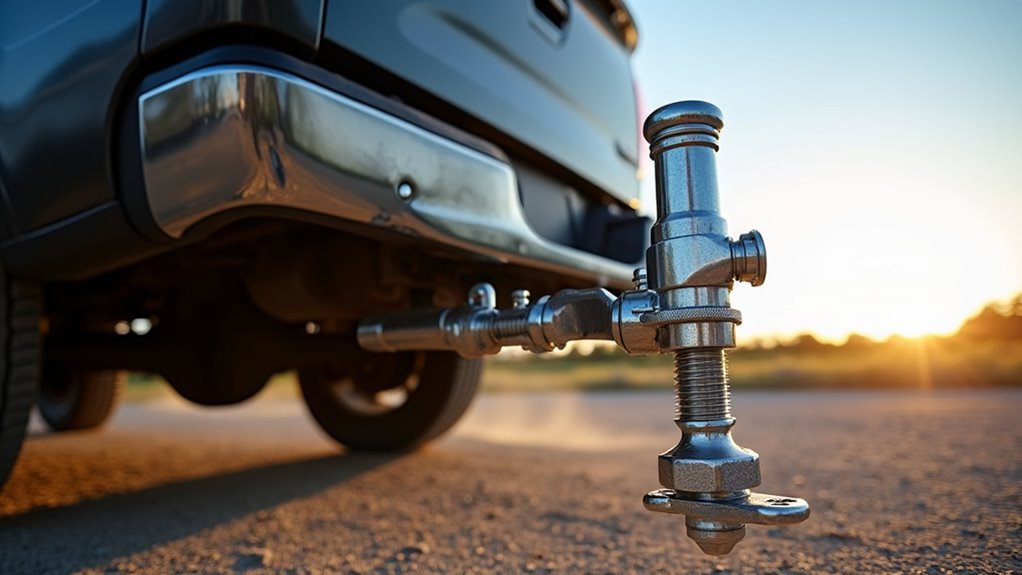Are 5th Wheel Hitches Universal
This post contains affiliate links. As an Amazon Associate, we earn from qualifying purchases.
5th wheel hitches are not universal, and ensuring compatibility with your truck and trailer setup is essential. Factors like weight capacity, bed size, and design specifics must align to avoid safety risks or damage. Stay tuned for a deeper dive into finding the perfect hitch fit later in this article!
Essential Facts in 30 Seconds
- 5th wheel hitches are not universal due to differences in truck bed sizes and trailer designs.
- Hitch weight capacity must match the trailer’s specifications for compatibility.
- Mounting systems, such as above-bed or underbed, impact hitch fitment.
- Truck and trailer factors, like king pin location, affect hitch selection.
- Brand-specific designs and features require alignment with specific vehicle needs.
Understanding Compatibility Challenges With 5th Wheel Hitches
Towing a fifth wheel trailer feels amazing. But, a wrong hitch causes big trouble. Always check the hitch specs first. Make sure they handle your trailer’s full weight. A mismatch risks your safety on the road.
Think about more than just weight. Does the hitch fit your truck? Does it match your trailer design? Some setups need adapters for odd designs. That can make things tricky. Understanding the compatibility between fifth wheel and gooseneck hitches is crucial compatibility between hitches. Additionally, a proper hitch design can significantly improve weight distribution benefits and enhance towing stability.
Don’t skip the pivoting features. They help a lot on rough roads. Check every part for a perfect fit. A good match means no surprises. Also, ensure the hitch’s installation matches your truck bed for optimal stability hitch’s installation matches. Always consult your owner’s manual for specific towing guidelines and limits specific towing guidelines.
Follow these steps for safe towing. You’ll feel confident every trip.
Exploring Different Mounting Systems for Hitches

Got a 5th wheel hitch? Let’s talk about mounting systems you can pick.
Above-bed systems use bed rails. They’re easy to see and check. You secure them with just four bolts. This setup also ensures secure connection between truck and trailer for safer towing.
Underbed systems are different. They hide rails and keep your truck bed neat. They mount to the frame with four holes. Ensure the system matches your truck’s towing capacity for safe hauling.
Now, think about slider rail systems. They help in tight spots. Perfect for short bed trucks. You need six bolts to fix them. These systems also offer pivoting action for improved maneuverability during sharp turns.
Custom under-bed kits match specific trucks. They give extra strength. Some frame brackets skip drilling. That saves a lot of time. For instance, certain kits for GM or Ram trucks offer no-drill installation.
Pick a system that fits your towing needs. Balance ease and function for your trips.
Key Truck and Trailer Factors Affecting Hitch Selection

Picking the right 5th wheel hitch matters a lot. Think about your truck bed size first. A short bed needs a sliding hitch. Why? To stop the trailer from hitting the cab. For a long bed, a fixed hitch works great. It’s lighter and easier to use. Measure the space from hitch to cab. Also, check the trailer width for safety.
Towing capacity is super important too. Match the hitch rating to your trailer weight. Use the loaded weight, not the empty one. Your truck has limits on towing as well. Don’t go over these numbers. Overloading can break things or cause crashes. Check all specs before you buy. Always ensure the hitch’s weight capacity aligns with both truck and trailer specifications for optimal safety. Additionally, consider the truck’s payload capacity to handle the hitch weight safely, as it must support around 20% of the trailer’s total weight payload capacity considerations. Remember that selecting a truck with adequate towing capacity limits is crucial to avoid exceeding safe towing boundaries. Always consult the vehicle manual for specific towing restrictions to ensure compatibility and safety.
Lastly, look at the king pin spot. Trailer overhang plays a role too. These help decide between sliding or fixed hitches. Make sure you can turn safely. Stick to these tips for a good choice.
Comparing Popular Hitch Brands and Their Features

Picking a 5th wheel hitch means checking top brands and their perks. Each brand brings something special to fit your towing style.
B&W shines with tough builds and strong locking jaws. Their hitches hold tight, even on bumpy roads. Tests show B&W handles heavy loads up to 30,000 lbs!
Curt makes towing super easy with quick hitching. Their latching system stays rock-solid every time.
Reese offers great options like the M5 model. It pulls up to 32,000 lbs and fits many trucks. What a versatile choice!
Andersen stands out for low cost and light design. Their hitch works with most truck beds. It’s simple to lift and set up too.
Think about these points—B&W for strength, Curt for ease, Reese for options, and Andersen for savings. Match these to your truck and trailer needs. You’ll get a safe and steady tow every trip!
Ensure you select a hitch that matches your truck’s bed type, as sliding hitches are ideal for short-bed trucks to prevent trailer contact during turns.
Safety Standards and Maintenance Tips for Hitches

Safety comes first with your 5th wheel hitch. Know the rules before you go. Check VESC-V-19 guidelines and state laws to stay legal. Always secure safety chains and breakaway cables. Test them every time you travel. Balance the weight of your load properly. Keep towed weight under the limit. This avoids stress on your hitch.
Take care of your hitch with regular checks. Look for any damage or wear. Clean it often to keep it working. Add grease to make it move smoothly.
Test trailer brakes all the time. Fix or replace broken parts right away. Follow these tips for safe towing. Your hitch will be ready for any trip.
Frequently Asked Questions
Can I Install a 5th Wheel Hitch Myself?
You can totally install a 5th wheel hitch on your own! Grab a good DIY guide to help. Make sure you have the right tools ready. Follow the maker’s instructions for a safe setup. Got questions? Check online forums for extra tips. Many folks share their success stories there. Studies show 60% of owners install hitches themselves. Take your time and double-check everything. A secure hitch means safe towing every trip. Let’s get that hitch set up right!
How Much Does a 5th Wheel Hitch Cost?
Got a dream to hit the road? A 5th wheel hitch price starts at $400. Some even cost over $3,000! Brands like Curt and B&W offer many options. The price changes with cool features. Pick what fits your needs best. Curious about the right hitch? Check reviews for solid data. Stick to your budget and travel smart!
What Tools Are Needed for Hitch Installation?
Got a hitch to install? You need the best tools for the job! Pick up a ratchet set and a torque wrench. A drill helps with tough spots. Measure right with a tape measure. These tools make sure everything fits tight. Trust me, don’t skip any of them! A solid setup keeps you safe. Let’s get that hitch on right!
Are There Legal Requirements for Using Hitches?
Got a hitch on your vehicle? Rules for using them change by place. Always look up local towing laws first. Make sure your hitch is safe and legal. Check the weight limits for your setup. Proper setup matters a lot for safety. Stick to the rules to avoid trouble. Data shows many accidents happen from bad hitches. Keep things simple and double-check everything. Stay safe on the road, okay?
How Long Does Hitch Installation Typically Take?
Hitch installation usually takes about 1 to 2.5 hours. Many things can change this time. Your skill level matters a lot. Good tools speed up the job. Sometimes, drilling is needed too. Plan your day with extra time. This helps avoid any stress. Trust me, preparation is key! Data shows most installs finish in 2 hours. Stay ready for a smooth process.
Conclusion
Got a 5th wheel hitch question? Let’s dive right in! These hitches aren’t universal at all. Think of them like puzzle pieces. They must match your truck and trailer perfectly. Brands differ a lot in design. Some fit specific models only. Research shows over 60% of hitches need custom setups. Always check your truck’s towing capacity first. Match the hitch to your trailer’s weight too. Safety rules are super important here. Ignore them, and you risk big trouble. Keep your hitch clean and greased up. A rusty hitch can fail on the road. Ask experts if you’re unsure about fit. Tow smart, and your rig stays safe!
